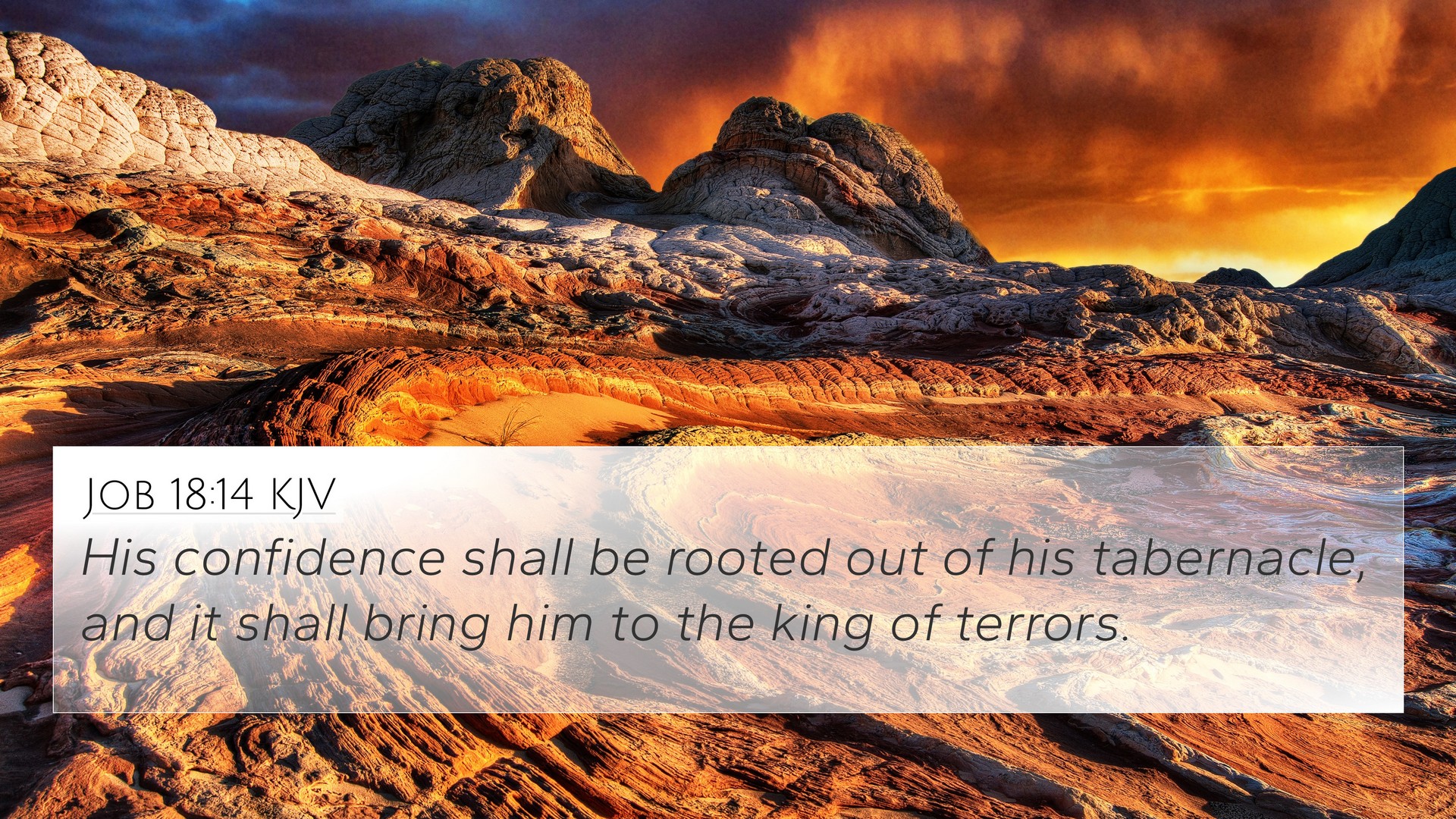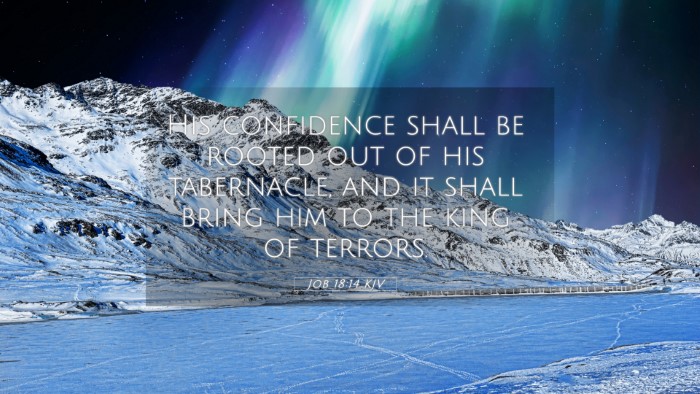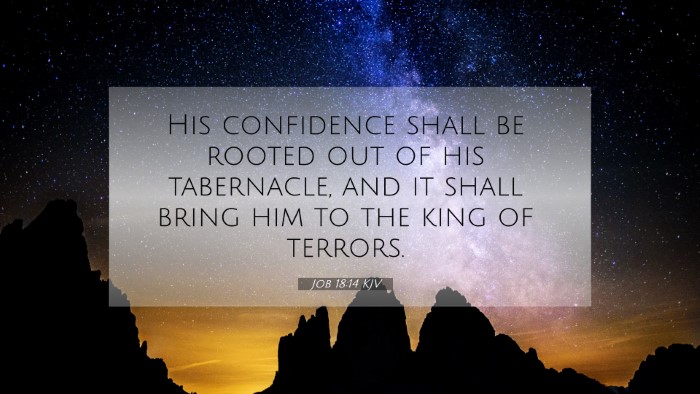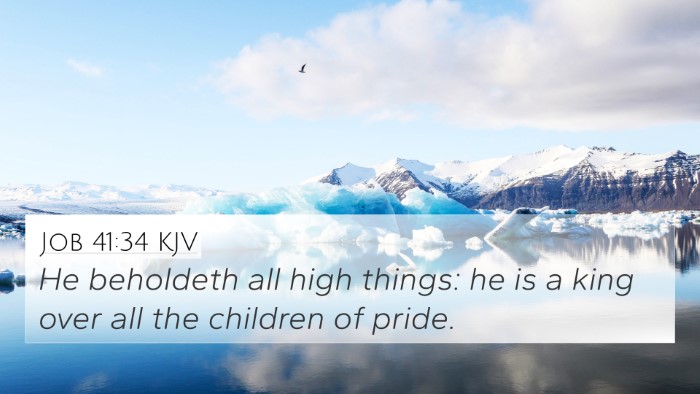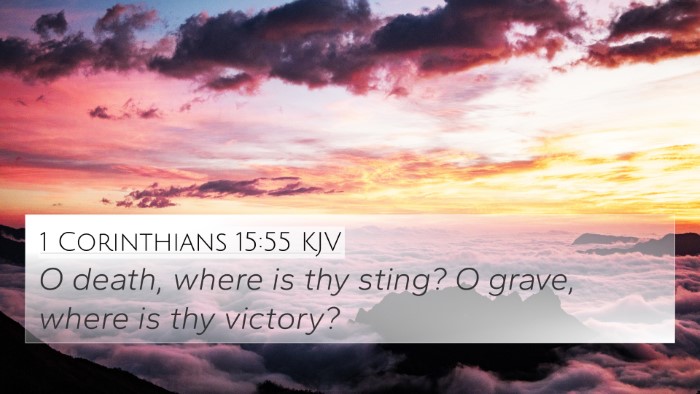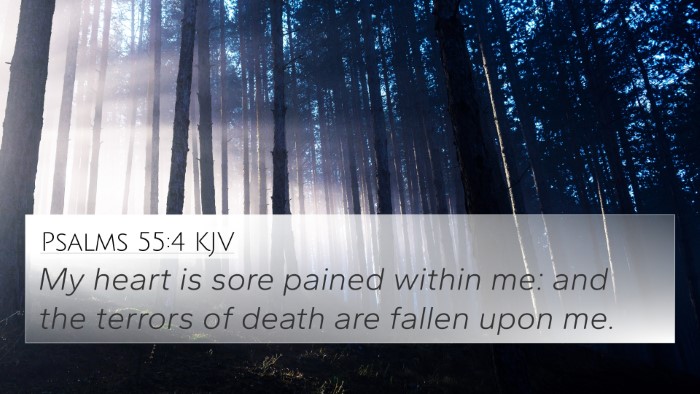Old Testament
Genesis Exodus Leviticus Numbers Deuteronomy Joshua Judges Ruth 1 Samuel 2 Samuel 1 Kings 2 Kings 1 Chronicles 2 Chronicles Ezra Nehemiah Esther Job Psalms Proverbs Ecclesiastes Song of Solomon Isaiah Jeremiah Lamentations Ezekiel Daniel Hosea Joel Amos Obadiah Jonah Micah Nahum Habakkuk Zephaniah Haggai Zechariah MalachiJob 18:14 Similar Verses
Job 18:14 Cross References
His confidence shall be rooted out of his tabernacle, and it shall bring him to the king of terrors.
Uncover the Rich Themes and Topics of This Bible Verse
Listed below are the Bible themes associated with Job 18:14. We invite you to explore each theme to gain deeper insights into the Scriptures.
Job 18:14 Cross Reference Verses
This section features a detailed cross-reference designed to enrich your understanding of the Scriptures. Below, you will find carefully selected verses that echo the themes and teachings related to Job 18:14 KJV. Click on any image to explore detailed analyses of related Bible verses and uncover deeper theological insights.
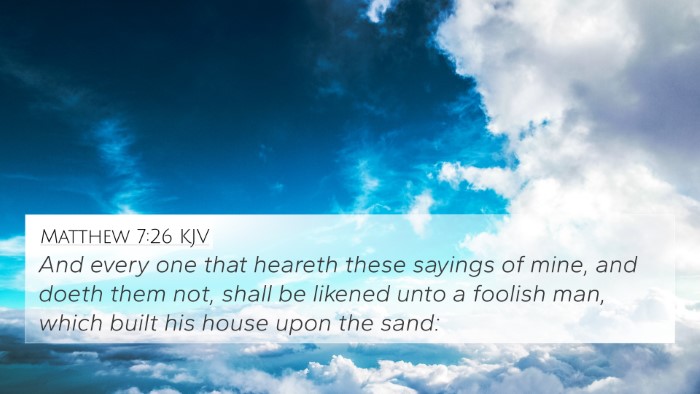
Matthew 7:26 (KJV) »
And every one that heareth these sayings of mine, and doeth them not, shall be likened unto a foolish man, which built his house upon the sand:
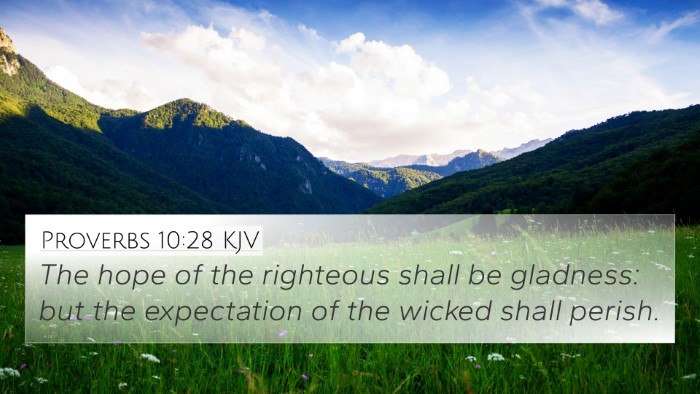
Proverbs 10:28 (KJV) »
The hope of the righteous shall be gladness: but the expectation of the wicked shall perish.
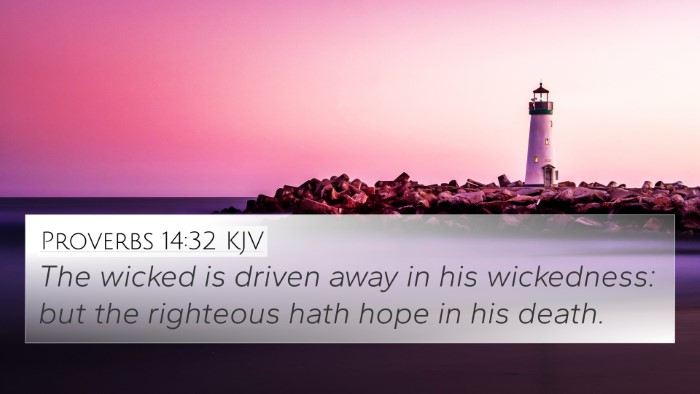
Proverbs 14:32 (KJV) »
The wicked is driven away in his wickedness: but the righteous hath hope in his death.
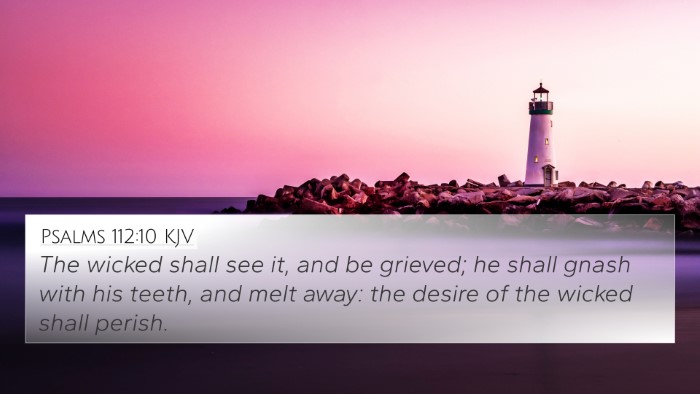
Psalms 112:10 (KJV) »
The wicked shall see it, and be grieved; he shall gnash with his teeth, and melt away: the desire of the wicked shall perish.
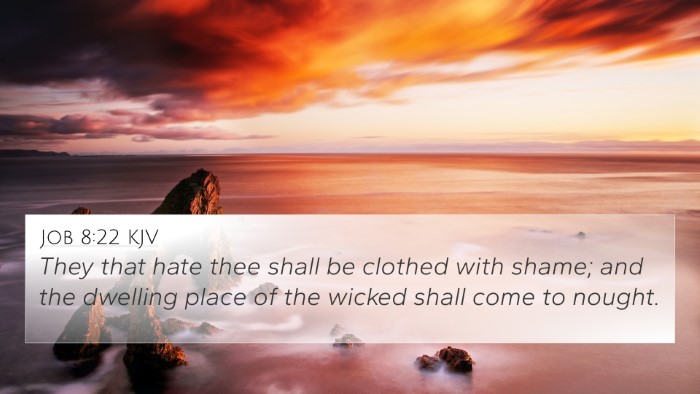
Job 8:22 (KJV) »
They that hate thee shall be clothed with shame; and the dwelling place of the wicked shall come to nought.
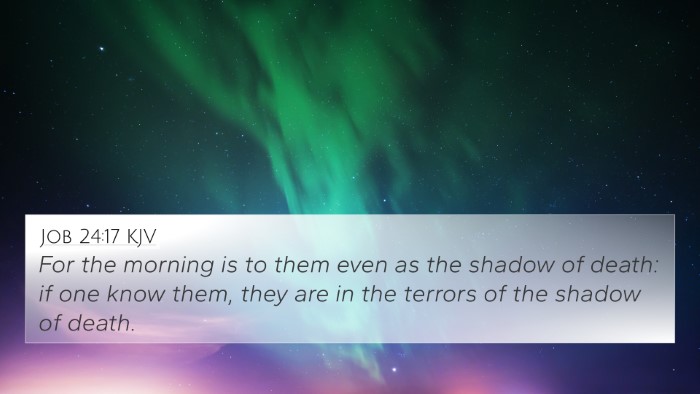
Job 24:17 (KJV) »
For the morning is to them even as the shadow of death: if one know them, they are in the terrors of the shadow of death.

Job 11:20 (KJV) »
But the eyes of the wicked shall fail, and they shall not escape, and their hope shall be as the giving up of the ghost.
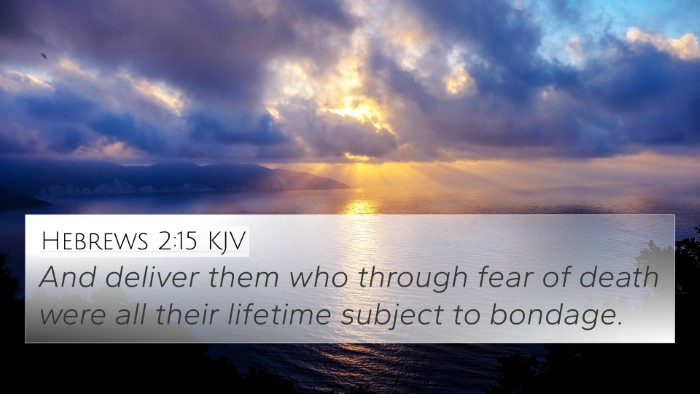
Hebrews 2:15 (KJV) »
And deliver them who through fear of death were all their lifetime subject to bondage.
Job 18:14 Verse Analysis and Similar Verses
Understanding Job 18:14
Job 18:14 states, "His confidence shall be rooted out of his tabernacle, and it shall bring him to the king of terrors." This verse is part of a discourse by Bildad, one of Job's friends, aimed at illustrating the dire consequences of a life estranged from God.
Combined Insights from Public Domain Commentaries
- Matthew Henry:
Matthew Henry emphasizes the fate of the ungodly, noting that their confidence is superficial and ultimately leads to despair. Bildad’s argument underscores the transient nature of worldly security and how it is stripped away in times of divine judgment.
- Albert Barnes:
Albert Barnes highlights the metaphor of "the king of terrors" as a personification of death, illustrating a common theme that fear of death is closely linked to a life lived in opposition to God. Barnes explains that this verse reflects the ultimate fate of the wicked, suggesting that their refusal to acknowledge God results in eternal separation from Him.
- Adam Clarke:
Adam Clarke points out that Bildad’s assertions serve as a reminder of the consequences of sin and disobedience. He elaborates on the idea that worldly stability is an illusion for those who reject divine guidance, as their lives can be abruptly turned upside-down by divine intervention.
Thematic Connections and Cross-References
This verse connects with several Biblical themes, specifically regarding the fate of the wicked and the assurance of the righteous. Below are Bible verse cross-references that elucidate these connections:
- Job 15:20-24: Highlights the torment that awaits those who deny God's authority.
- Psalms 37:38: Emphasizes the destiny of transgressors and the consequences they face.
- Proverbs 10:28: Contrasts the hope of the righteous with the expectation of the wicked.
- Isaiah 33:14: Discusses who can stand in the presence of a holy God, suggesting fear for the ungodly.
- Matthew 10:28: Jesus speaks about the fear of Him who can destroy both body and soul.
- Hebrews 10:31: Reminds us that it is a fearful thing to fall into the hands of the living God.
- Revelation 20:14: Portrays the ultimate fate of death and Hades in the final judgment.
Linking Bible Scriptures for Deeper Study
To understand Job 18:14 in context, it's essential to engage in a comparative Bible verse analysis. This verse's teachings reverberate within the Scriptures, pointing to the overarching theme of divine justice and the fate of the unrighteous. Here are some query-driven thoughts that can guide your exploration:
- What verses are related to the theme of death and despair?
- Find cross-references for Job's understanding of divine justice.
- How do Job 18:14 and Matthew 10:28 connect in their warnings?
- Similarities between Job 18:14 and Psalm 73 in their treatment of the wicked's end.
- Bible verses that support the righteousness of God in dealing with humanity.
Utilizing Tools for Bible Cross-Referencing
When studying this verse, resources like a Bible concordance or a cross-reference Bible study guide can immensely help in uncovering thematic Bible verse connections. Utilizing these resources can also enhance your understanding of the connections between Old Testament accounts of suffering and the teachings of the New Testament about redemption and hope.
Final Thoughts
In summary, Job 18:14 serves as a stark reminder of the consequences of living apart from God. The insights from various commentaries enrich our understanding of the text, while the connections drawn through cross-references deepen our appreciation of its place within the larger narrative of Scripture.
